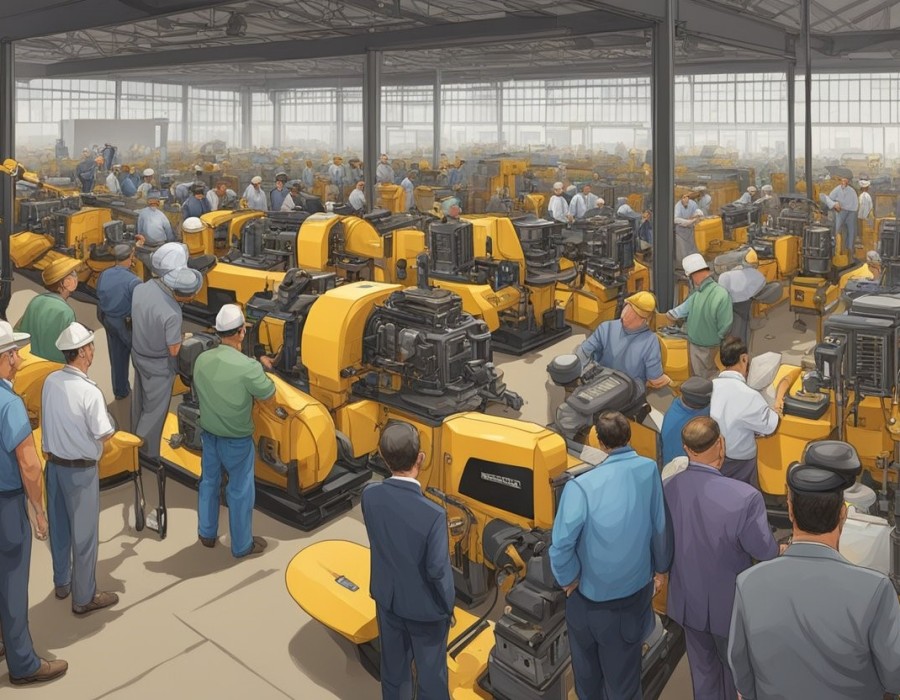Machinery auctions are popular events for those looking to buy or sell used equipment. These auctions offer a unique opportunity for buyers to find quality machinery at a lower cost than buying new, while sellers can quickly liquidate assets and capitalize on the demand for used equipment. Auctions can be held in person or online, with both options offering advantages and disadvantages.
In-person auctions provide buyers with the chance to inspect the machinery before bidding, which can be especially important for those looking to buy larger or more specialized equipment. Additionally, in-person auctions often have a lively atmosphere, with bidders vying for the same equipment and creating a sense of competition. However, attending an in-person auction can be time-consuming and may require travel, which can be inconvenient for some buyers.
Online auctions, on the other hand, offer convenience and accessibility. Buyers can participate from anywhere with an internet connection, and auctions can be accessed at any time of day. Online auctions often have a wider selection of machinery available, as sellers from all over the world can participate. However, buyers cannot physically inspect the equipment before bidding, which can be a drawback for some.
Understanding Machinery Auctions
Machinery auctions are a great opportunity for buyers to purchase equipment at a reasonable price. Before participating in an auction, it is important to understand the different types of auctions, the benefits of buying at auction, and the key auction terminologies.
Types of Machinery Auctions
There are two main types of machinery auctions: live auctions and online auctions. Live auctions are held at a physical location, where buyers can inspect the equipment before bidding. Online auctions, on the other hand, are conducted over the internet, and buyers can only inspect the equipment through pictures and descriptions.
Benefits of Buying at Auction
Buying equipment at an auction can provide many benefits. Firstly, auctions offer a wide range of equipment to choose from, which increases the chances of finding the right equipment at the right price. Secondly, auctions are a great way to purchase equipment at a lower price than buying new. Lastly, auctions are a transparent process, where buyers can see the bidding process and know what they are paying for.
Key Auction Terminologies
Before participating in an auction, it is important to understand the key terminologies used. Here are some of the most common terms:
- Reserve Price: The minimum price that the seller is willing to accept for the equipment.
- Bid Increment: The minimum amount by which a bid can be increased.
- Buyer's Premium: An additional fee added to the final bid amount, which is paid by the buyer to the auctioneer.
- As-Is: The equipment is sold in its current condition, and the seller does not guarantee its condition or performance.
In conclusion, understanding the different types of machinery auctions, the benefits of buying at auction, and the key auction terminologies is essential for any buyer looking to purchase equipment at an auction.
Preparing for a Machinery Auction
When preparing for a machinery auction, it is important to do your due diligence to ensure that you are well-informed and ready to make informed decisions. This section will cover key aspects to consider when preparing for a machinery auction.
Research and Valuation
Before attending a machinery auction, it is important to research the equipment you are interested in and determine its value. This can be done by researching comparable equipment sales online or getting a professional appraisal. Knowing the value of the equipment will help you make informed decisions during the bidding process.
Inspection Guidelines
It is important to thoroughly inspect the equipment before the auction. This includes checking for any damage or wear and tear, as well as testing the equipment to ensure it is in good working condition. It is also recommended to bring a mechanic or equipment expert with you to the inspection to provide additional insight.
Registration and Bidding Process
To participate in a machinery auction, you will need to register beforehand. This typically involves providing personal and financial information, as well as agreeing to the auction terms and conditions. During the auction, it is important to pay attention to the bidding process and be prepared to act quickly if you are interested in a particular piece of equipment.
Payment and Logistics
After winning a bid, it is important to arrange for payment and logistics. This includes arranging for transportation of the equipment and ensuring that payment is made in a timely manner. It is recommended to have a plan in place for these logistics before attending the auction to ensure a smooth process.
Overall, preparing for a machinery auction requires careful research and planning. By following these guidelines and being well-informed, you can increase your chances of making successful bids and acquiring the equipment you need.





Comments